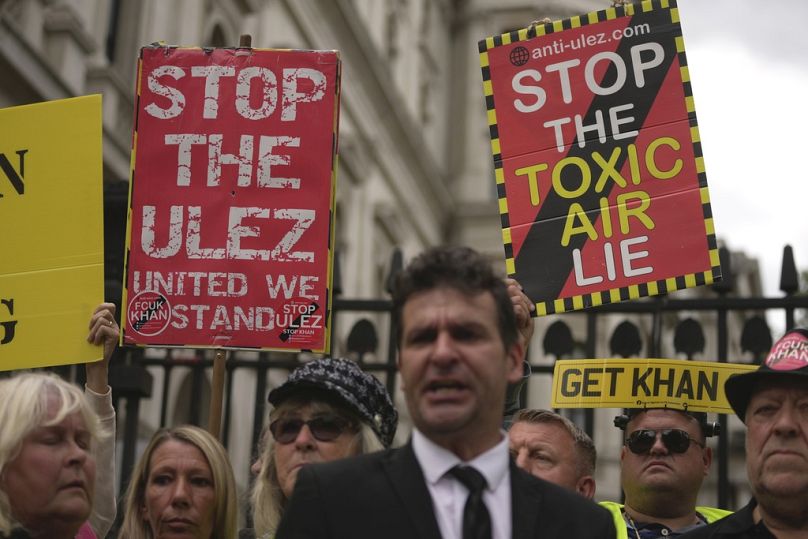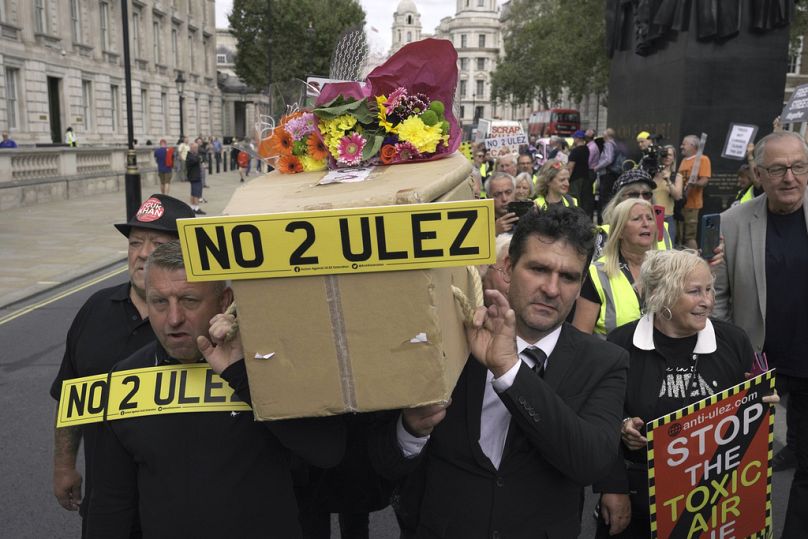London’s traffic cameras are under attack. Police say hundreds of license plate-reading cameras have been damaged, disconnected or stolen by opponents of an anti-pollution charge on older vehicles that came into force across the metropolis on Tuesday.
The vandalism by vigilantes calling themselves the Blade Runners shows that emotions are running high over the city’s Ultra Low Emission Zone.
London’s mayor says the measure will cut air pollution that is linked to about 4,000 deaths a year in the British capital. Critics say it’s a cash grab that will penalize suburban residents who depend on their cars for work and essential travel.
“The cameras are going to keep coming down,” predicted Nick Arlett, who has organized protests against the clean-air charge and says he neither condones nor condemns the sabotage “People are angry.”
Moves in the UK to cut air pollution and reduce car use have become a political flashpoint. Supporters say cynical politicians and conspiracy theorists are exploiting opposition to the plans. The Conservative government has attacked London's vehicle levy, leading to allegations it is backing down on green pledges.
London's plan, known as the ULEZ, levies a £12.50 daily charge on most gas cars and vans built before 2006 and on pre-2015 diesel vehicles. Introduced in central London in 2019, it was expanded in 2021 to the city’s inner suburbs. From Tuesday it covers all of Greater London, including the sprawling outer suburbs where more than half the city’s 9 million people live.
Mayor Sadiq Khan says the expansion means “5 million more Londoners being able to breathe cleaner air.”
“It was a difficult decision, but it’s a vital one and a right one," he said Tuesday.
But some suburbanites say it will be an unbearable new expense, amid a cost-of-living squeeze that saw inflation top 11 per cent late last year. Outer London has higher levels of car ownership and less public transit than the city centre.
“It’s going to make poor people poorer,” said Anna Austen, who says she relies on her 15-year-old diesel car to get to work and take her children to school.
“I have no money to pay the fines, I have no money to replace my car,” said Austen, who joined a recent protest by several dozen ULEZ opponents beside a busy road in south London. Some passing drivers honked loudly when encouraged to “beep for freedom.”
The issue shot up the national political agenda in July when the governing Conservatives unexpectedly won a special election in the outer London district of Uxbridge by campaigning against the levy introduced by Mayor Khan, a member of the opposition Labour Party.
Since then, Prime Minister Rishi Sunak has asked for a review of Low Traffic Neighborhoods - often locally controversial zones where cars are banned from some residential streets - and slammed Labour as hostile to motorists. He has also approved new North Sea oil and gas drilling, sparking accusations the U.K. is backsliding on its climate commitments.
Sunak’s government says it remains committed to banning the sale of new gas and diesel cars by 2030 and reaching net zero carbon emissions by 2050.
Sunak said Tuesday that the new car charge "is going to hit working families. I don’t think that’s the right priority.”
Labour points out that the ULEZ was originally announced in 2015 by then-Mayor Boris Johnson, a Conservative. But Labour was rattled by the Uxbridge result, despite its big lead in opinion polls nationwide. Leader Keir Starmer urged London’s mayor to “reflect” on the ULEZ expansion. Khan refused to delay but expanded a scrappage program that offers London residents up to £2,000 to replace old vehicles. Opponents say the money is nowhere near enough.
The air in London, a city once nicknamed the Big Smoke, is getting cleaner¸ though the impact of the ULEZ is debated. A 2021 study by Imperial College London suggested the zone had a relatively small effect on air pollution in the 12 weeks after its central London launch. But research published by the mayor’s office in February found that emissions of harmful nitrogen oxides were 26 per cent lower in the ULEZ area since 2019 than they would have been without it, and emissions of particulate matter were 19 per cent lower.
“We know that low emission zones work,” said Simon Birkett, director of the campaigning group Clean Air in London, arguing that “big problems need big solutions.”
ULEZ opponents include trade unions and ordinary Londoners, but backers of the plan claim the issue is also being exploited by extremists. Khan told radio station LBC last week that opposition had been “weaponized” by “people who believed in conspiracy theories.”
At a recent demonstration, protesters chanted “Get Khan out,” and many placards attacked the city’s first Muslim mayor personally, sometimes in crude terms. Several protesters referred to Khan as a puppet of larger forces, including the World Economic Forum and the United Nations, that they alleged sought to control society. Some also expressed doubt about the extent of human-caused climate change.
One group involved in the protests¸ Together, was created in 2021 to campaign against coronavirus lockdowns and vaccine mandates. It has since turned its attention to low-traffic neighbourhoods, clean-air schemes and plans for central bank digital currencies.
Co-founder Alan Miller says he’s no conspiracy theorist but that over all those issues the public feels “ignored and treated with contempt” by politicians and bureaucrats.
Other European cities have had varied results with plans to tackle air pollution. Madrid has a similar low-emission zone to London, while Paris's plan to ban all diesel and older petrol cars has faced delays.
Supporters of the London plan hope the opposition will fade over time. But Tony Travers, professor of government at the London School of Economics, said he expects to see politicians exploit this “classic political wedge issue” in next year’s national election.
“The use of cars and freedom to use them and where people can drive have great cut-through, in a way that many other issues don’t,” Travers said. “Could pro- and anti-motorists be turned into a theme for the general election? I think it will be.”













